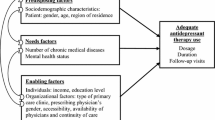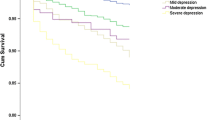Abstract
Depressed patients discharged from psychiatric hospitalizations face increased risks for adverse outcomes including suicide, yet antidepressant adherence rates during this high-risk period are unknown. Using Veterans Affairs (VA) data, we assessed antidepressant adherence and predictors of poor adherence among depressed veterans following psychiatric hospitalization. We identified VA patients nationwide with depressive disorders who had a psychiatric hospitalization between April 1, 1999 and September 30, 2003, received antidepressant medication, and had an outpatient appointment following discharge. We calculated medication possession ratios (MPRs), a measure of medication adherence, within 3 and 6 months following discharge. We assessed patient factors associated with having lower levels of adherence (MPRs < 0.8) after discharge. The criteria for 3- and 6-month MPRs were met by 20,931 and 23,182 patients respectively. The mean 3 month MPR was 0.79 (SD = 0.37). The mean 6 month MPR was 0.66 (SD = 0.40). Patients with poorer adherence were male, younger, non-white, and had a substance abuse disorder, but were less likely to have PTSD or other anxiety disorders. Poor antidepressant adherence is common among depressed patients after psychiatric hospitalization. Efforts to improve adherence at this time may be critical in improving the outcomes of these high-risk patients.
Similar content being viewed by others
References
Adams, J., & Scott, J. (2000). Predicting medication adherence in severe mental disorders. Acta Psychiatrica Scandinavica, 101, 119–124.
Aikens, J. E., Nease, D. E., Nan, D. P., et al. (2005). Adherence to maintenance-phase antidepressant medication as a function of patient beliefs about medication. Annals of Family Medicine, 3, 23–30.
Akincigil, A., Bowblis, J. R., Levin, C., et al. (2007). Adherence to antidepressant treatment among privately insured patients diagnosed with depression. Medical Care, 45, 363–369.
Ballenger, J. C. (2000). Anxiety and depression: Optimizing treatments. Primary Care Companion to the Journal of Clinical Psychiatry, 2, 71–79.
Bambauer, K. Z., Adams, A. S., Zhang, F., et al. (2006). Physician alerts to increase antidepressant adherence: Fax or fiction? Archives of Internal Medicine, 166, 498–504.
Bambauer, K. Z., Soumerai, S. B., Adams, A. S., et al. (2007). Provider and patient characteristics associated with antidepressant nonadherence: The impact of provider specialty. Journal of Clinical Psychiatry, 68, 867–873.
Beck, C. A., Patten, S. B., Williams, J. V. A., et al. (2005). Antidepressant utilization in Canada. Social Psychiatry and Psychiatric Epidemiology, 40, 799–807.
Becker, M. H., & Maiman, L. A. (1975). Sociobehavioral determinants of compliance with health and medical care recommendations. Medical Care, 13, 10–24.
Blow, F. C., Owen, R. E., Valenstein, M., et al. (2003) Specialty care for veterans with depression in the VHA 2002 National Depression Registry Report. Ann Arbor, MI, VA National Serious Mental Illness Treatment Research & Evaluation Center (SMITREC), VHA Health Services Research & Development.
Brown, C., Battista, D. R., Bruehlman, R., et al. (2005). Beliefs about antidepressant medications in primary care patients: Relationship to self-reported adherence. Medical Care, 43, 1203–1207.
Bull, S. A., Hu, X. H., Hunkeler, E. M., et al. (2002). Discontinuation of use and switching of antidepressants: Influence of patient-physician communication. The Journal of the American Medical Association, 288, 1403–1409.
Burra, T. A., Chen, E., McIntyre, R. S., et al. (2007). Predictors of self-reported antidepressant adherence. Behavioral Medicine, 32, 127–134.
Busch, S. H., Leslie, D., & Rosenheck, R. (2004). Measuring quality of pharmacotherapy for depression in a national health care system. Medical Care, 42, 532–542.
Cantrell, C. R., Eaddy, M. T., Shah, M. B., et al. (2006). Methods for evaluating patient adherence to antidepressant therapy: A real-world comparison of adherence and economic outcomes. Medical Care, 44, 300–303.
Crown, W. H., Finkelstein, S., Berndt, E. R., et al. (2002). The impact of treatment-resistant depression on health care utilization and costs. Journal of Clinical Psychiatry, 63, 963–971.
Demyttenaere, K., Adelin, A., Patrick, M., et al. (2008). Six-month compliance with antidepressant medication in the treatment of major depressive disorder. International Clinical Psychopharmacology, 23, 36–42.
Demyttenaere, K., Van Ganse, E., Gregoire, J., et al. (1998). Compliance in depressed patients treated with fluoxetine or amitriptyline. Belgian Compliance Study Group. International Clinical Psychopharmacology, 13, 11–17.
Desai, R. A., & Rosenheck, R. A. (2002). The impact of managed care on cross-system use of mental health services by veterans in Colorado. Psychiatric Services, 53, 1599–1604.
Desai, R. A., Rosenheck, R. A., & Rothbard, A. (2001). Cross-system service use among VA mental health patients living in Philadelphia. Administration and Policy In Mental Health, 28, 299–309.
Devane, C. L., Chiao, E., Franklin, M., et al. (2005). Anxiety disorders in the 21st century: Status, challenges, opportunities, and comorbidity with depression. The American Journal of Managed Care, 11, S344–S353.
Finley, P. R., Rens, H. R., Pont, J. T., et al. (2002). Impact of a collaborative pharmacy practice model on the treatment of depression in primary care. American Journal of Health-System Pharmacy, 59, 1518–1526.
Geddes, J. R., Carney, S. M., Davies, C., et al. (2003). Relapse prevention with antidepressant drug treatment in depressive disorders: A systematic review. Lancet, 361, 653–661.
Givens, J. L., Datto, C. J., Ruckdeschel, K., et al. (2006). Older patients’ aversion to antidepressants—A qualitative study. Journal of General Internal Medicine, 21, 146–151.
Goethe, J. W., Woolley, S. B., Cardoni, A. A., et al. (2007). Selective serotonin reuptake inhibitor discontinuation—Side effects and other factors that influence medication adherence. Journal of Clinical Psychopharmacology, 27, 451–458.
Hansen, P. E., Wang, A. G., Stage, K. B., et al. (2003). Comorbid personality disorder predicts suicide after major depression: A 10-year follow-up. Acta Psychiatrica Scandinavica, 107, 436–440.
Horne, R., & Weinman, J. (1999). Patients’ beliefs about prescribed medicines and their role in adherence to treatment in chronic physical illness. Journal of Psychosomatic Research, 47, 555–567.
Jones, L. E., Turvey, C., & Carney-Doebbeling, C. (2006). Inadequate follow-up care for depression and its impact on antidepressant treatment duration among veterans with and without diabetes mellitus in the Veterans Health Administration. General Hospital Psychiatry, 28, 465–474.
Katon, W., Rutter, C., Ludman, E. J., et al. (2001). A randomized trial of relapse prevention of depression in primary care. Archives of General Psychiatry, 58, 241–247.
Katon, W., von Korff, M., Lin, E., et al. (1992). Adequacy and duration of antidepressant treatment in primary care. Medical Care, 30, 67–76.
Keene, M. S., Eaddy, M. T., Nelson, W. W., et al. (2005). Adherence to paroxetine CR compared with paroxetine IR in a medicare-eligible population with anxiety disorders. American Journal of Managed Care, 11, S362–369.
Keller, M. B., Hirschfeld, R. M., Demyttenaere, K., et al. (2002). Optimizing outcomes in depression: Focus on antidepressant compliance. International Clinical Psychopharmacology, 17, 265–271.
Kerr, E. A., McGlynn, E. A., Van Vorst, K. A., et al. (2000). Measuring antidepressant prescribing practice in a health care system using administrative data: Implications for quality measurement and improvement. Joint Commission Journal on Quality Improvement, 26, 203–216.
Lenze, E. J. (2003). Comorbidity of depression and anxiety in the elderly. Current Psychiatry Reports, 5, 62–67.
Leventhal, H., Diefenbach, M., & Leventhal, E. A. (1992). Illness cognition—Using common-sense to understand treatment adherence and affect cognition interactions. Cognitive Therapy and Research, 16, 143–163.
Maidment, R., Livingston, G., & Katona, C. (2002). Just keep taking the tablets: Adherence to antidepressant treatment in older people in primary care. International Journal of Geriatric Psychiatry, 17, 752–757.
McCarthy, J., Zivin, K., Austin, K., et al. (2008). Does consideration of medicare use affect va evaluations of treatment for new episodes of depression? Administration and Policy In Mental Health, 35, 468–476.
Melartin, T. K., Rytsala, H. J., Leskela, U. S., et al. (2005). Continuity is the main challenge in treating major depressive disorder in psychiatric care. Journal of Clinical Psychiatry, 66, 220–227.
Melfi, C. A., Chawla, A. J., Croghan, T. W., et al. (1998). The effects of adherence to antidepressant treatment guidelines on relapse and recurrence of depression. Archives of General Psychiatry, 55, 1128–1132.
Mittal, D., Fortney, J. C., Pyne, J. M., et al. (2006). Impact of comorbid anxiety disorders on health-related quality of life among patients with major depressive disorder. Psychiatric Services, 57, 1731–1737.
National Committee for Quality Assurance (2003) Antidepressant medication management (effective continuation phase treatment) Washington, DC, National Commitee for Quality Assurance (NCQA).
National Committee for Quality Assurance (NCQA) (2003) Antidepressant medication management (effective acute treatment phase) Washington, DC, National Committee for Quality Assurance (NCQA).
Olfson, M., Marcus, S. C., Tedeschi, M., et al. (2006). Continuity of antidepressant treatment for adults with depression in the United States. American Journal of Psychiatry, 163, 101–108.
Ozmen, E., Ogel, K., Aker, T., et al. (2005). Public opinions and beliefs about the treatment of depression in urban Turkey. Social Psychiatry and Psychiatric Epidemiology, 40, 869–876.
Pfeiffer, P. N., Ganoczy, D., Ilgen, M., et al. (2009) Comorbid anxiety as a suicide risk factor among depressed veterans. Depression and Anxiety. doi:10.1002/da.20583.
Richeimer, S. H., Bajwa, Z. H., Kahraman, S. S., et al. (1997). Utilization patterns of tricyclic antidepressants in a multidisciplinary pain clinic: A survey. Clinical Journal of Pain, 13, 324–329.
Robinson, R. L., Long, S. R., Chang, S., et al. (2006). Higher costs and therapeutic factors associated with adherence to ncqa hedis antidepressant medication management measures: Analysis of administrative claims. Journal of Managed Care Pharmacy, 12, 43–54.
Sewitch, M. J., Blais, R., Rahme, E., et al. (2007). Receiving guideline-concordant pharmacotherapy for major depression: Impact on ambulatory and inpatient health service use. Canadian Journal of Psychiatry-Revue Canadienne De Psychiatrie, 52, 191–200.
Sheehan, D. V., Keene, M. S., Eaddy, M., et al. (2008). Differences in medication adherence and healthcare resource utilization patterns: Older versus newer antidepressant agents in patients with depression and/or anxiety disorders. CNS Drugs, 22, 963–973.
Sikka, R., Xia, F., & Aubert, R. E. (2005). Estimating medication persistency using administrative claims data. American Journal of Managed Care, 11, 449–457.
Sirey, J. A., Bruce, M. L., Alexopoulos, G. S., et al. (2001). Stigma as a barrier to recovery: Perceived stigma and patient-rated severity of illness as predictors of antidepressant drug adherence. Psychiatric Services, 52, 1615–1620.
Smith, M. W., & Joseph, G. J. (2003). Pharmacy data in the VA health care system. Medical Care Research and Review, 60, 92S–123S.
Spettell, C. M., Wall, T. C., Allison, J., et al. (2003). Identifying physician-recognized depression from administrative data: Consequences for quality measurement. Health Services Research, 38, 1081–1102.
Stein, M. B., Cantrell, C. R., Sokol, M. C., et al. (2006). Antidepressant adherence and medical resource use among managed care patients with anxiety disorders. Psychiatric Services, 57, 673–680.
Valenstein, M., Copeland, L. A., Blow, F. C., et al. (2002). Pharmacy data identify poorly adherent patients with schizophrenia at increased risk for admission. Medical Care, 40, 630–639.
Valenstein, M., Ganoczy, D., McCarthy, J. F., et al. (2006). Antipsychotic adherence over time among patients receiving treatment for schizophrenia: A retrospective review. Journal of Clinical Psychiatry, 67, 1542–1550.
Valenstein, M., Kim, H. M., Ganoczy, D., et al. (2009). Higher-risk periods for suicide among VA patients receiving depression treatment: Prioritizing suicide prevention efforts. Journal of Affective Disorders, 112, 50–58.
Vermeire, E., Hearnshaw, H., Van Royen, P., et al. (2001). Patient adherence to treatment: three decades of research. A comprehensive review. Journal of Clinical Pharmacy & Therapeutics, 26, 331–342.
White, T. J., Vanderplas, A., Ory, C., et al. (2003). Economic impact of patient adherence with antidepressant therapy within a managed care organization. Disease Management & Health Outcomes, 11, 817–822.
Wiegand, M. H. (2008). Antidepressants for the treatment of insomnia a suitable approach? Drugs, 68, 2411–2417.
Acknowledgements
This study was funded in part by the Department of Veterans Affairs, Health Services Research and Development Service, IIR 04-211-1 (MV), CD2 07-206-1 (KZ), the National Institute of Mental Health, R01-MH078698-01 (MV), and by the Depression Health Services Research Evaluation and Management (DREAM) program in the Comprehensive Depression Center at the University of Michigan.
Author information
Authors and Affiliations
Corresponding author
Additional information
Previous presentation: This paper was presented in poster form at the Annual Health Services Research and Development Meeting of the Department of Veterans Affairs, Baltimore, MD, February 2009.
Appendices
Appendix 1: Patient Depression and Other Psychiatric Disorder ICD-9 Codes and Corresponding Diagnoses
Appendix 2: Types of Antidepressants Included in this Study
Amitriptyline (high dose only) |
Amoxapine |
Atomoxetine |
Buproprion |
Citalopram |
Clomipramine |
Desipramine |
Doxepin |
Duloxetine |
Escitalopram |
Fluoxetine |
Fluvoxamine |
Imipramine |
Isocarboxazid |
Maprotiline |
Mirtazapine (high dose only) |
Nefazodone |
Nortriptyline (high dose only) |
Paroxetine |
Phenelzine |
Protriptyline |
Sertraline |
Tranylcypromine |
Trazodone (high dose only) |
Trimipramine |
Venlafaxine |
Rights and permissions
About this article
Cite this article
Zivin, K., Ganoczy, D., Pfeiffer, P.N. et al. Antidepressant Adherence After Psychiatric Hospitalization Among VA Patients with Depression. Adm Policy Ment Health 36, 406–415 (2009). https://doi.org/10.1007/s10488-009-0230-2
Received:
Accepted:
Published:
Issue Date:
DOI: https://doi.org/10.1007/s10488-009-0230-2




